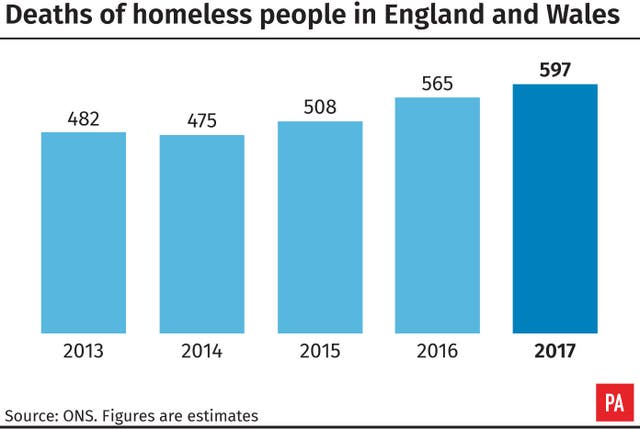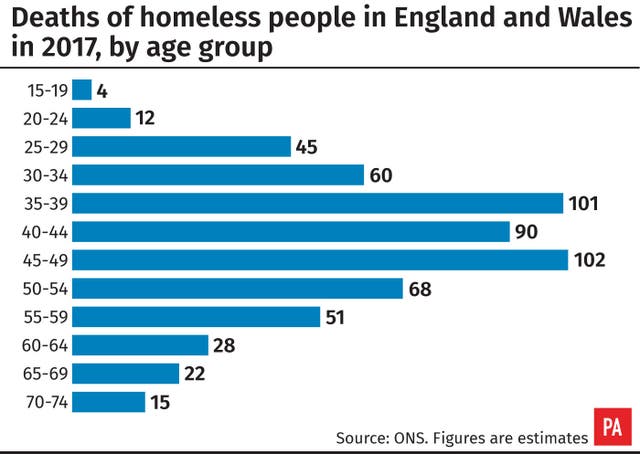What to do when you see someone sleeping rough
A guide to the steps to take if you’re concerned about someone sleeping outside.

An estimated 597 homeless people died in England and Wales in 2018, with the numbers rising by 24% over the past five years.
The figures from the Office for National Statistics come as temperatures plunge across the country – so what do you do when you see someone sleeping rough on the streets?
The initial answer is the same wherever you are. Specialists and volunteers say having a chat with a rough sleeper, if you feel comfortable doing so, can go a long way.
Without being intrusive, it is advised that you might want to ask their name, who they are and what their situation is.
What is somewhat harder is working out what to do next – and this depends on the situation. Here are a few things to consider.
Does the person need emergency help?
1. If the person in question is likely to be under 18 or is sleeping rough with a child in their care, this is a matter to refer to the police and social services immediately as local authorities have a legal obligation to provide shelter to children.
2. If the person is in need of urgent medical attention, for example if they have an open wound or appear to be seriously ill, calling 999 for an ambulance will get them professional help quickly.
3. Another immediate concern, especially in cold conditions, is where the person is set to spend the next few hours. Day shelters offering food and clothing and – usually during the winter months – night shelters that offer safe, warm sleeping areas, are in operation in many areas, so Google those running in your area or search via homeless.org.uk.

During the extremely cold weather – specifically, when temperatures fall to zero degrees or lower for three days – special measures come into action with the Severe Weather Emergency Protocol (SWEP).
When this comes into force, the local authority and other organisations in the area will work to offer extra temporary accommodation where possible.
Your local authority’s housing options number – usually easy to find online – can give you more information on whether SWEP is in place and what local shelter options are available.
How do I alert the local authority?
Assuming none of the above applies, and no immediate shelter is available, you can still help a rough sleeper get on the path to engaging with services – usually through their local authority. It is important, if you have been able to speak to them, that you get their consent to do this.
One option available for members of the public in England and Wales is StreetLink – a service that centralises reporting of rough sleepers.
A call or online referral to StreetLink will, where appropriate, be passed to the relevant local services – usually local authority outreach teams who operate at night.
Each council’s team has a different timetable dependent on demand, but they typically aim to reach a rough sleeper in one to three nights and offer support.
Sending an alert about a rough sleeper when SWEP provision is in place will ensure local services are aware of the individual and can refer them to this emergency accommodation.
Due to the high volume of calls, StreetLink advises that the best method to refer rough sleepers is via the website or app.
What if I live outside England and Wales?
There is no equivalent centralised service for referring rough sleepers in Scotland or Northern Ireland.
In Scotland, Shelter Scotland can offer help and advice, while people in Northern Ireland are advised to refer rough sleepers to the Northern Ireland Housing Executive as a first port of call.
What information do I need to give?
Local outreach teams will welcome as much of the following information as possible in order to locate a rough sleeper:
Night-time sleep location: This is absolutely key in many cases, as this is when most outreach teams operate. If you have this information, be as precise as possible.
A physical description: For obvious reasons, this can go a long way to helping outreach workers find someone who is rough sleeping.
Any particular concerns: Health issues (whether the rough sleeper has medication that requires refrigeration, for example), or other concerns workers should be aware of if and when they meet the rough sleeper.

Many have different views and feelings about giving money to people they meet on the street, and there isn’t any right answer to this issue.
Some feel more comfortable donating to housing or homelessness charities – of which there are a number – to help tackle the issue.
However, if you are unable to help in any other way, there’s certainly no harm in offering someone a warm drink, some food or a blanket – or even just someone to talk to for a while.





